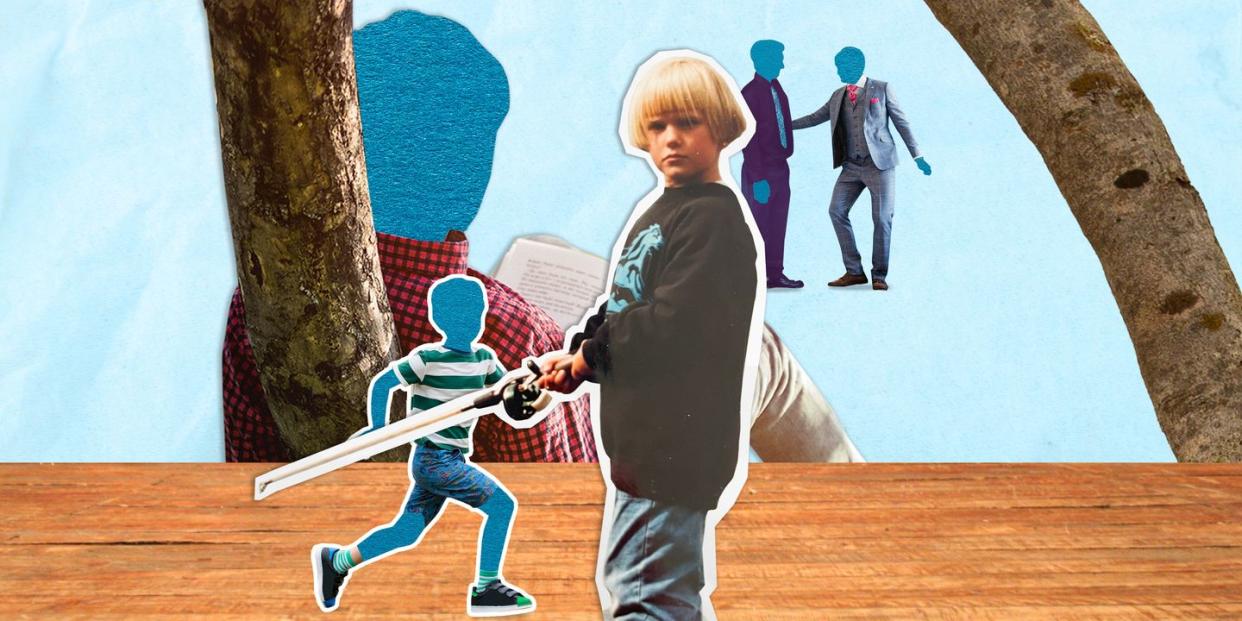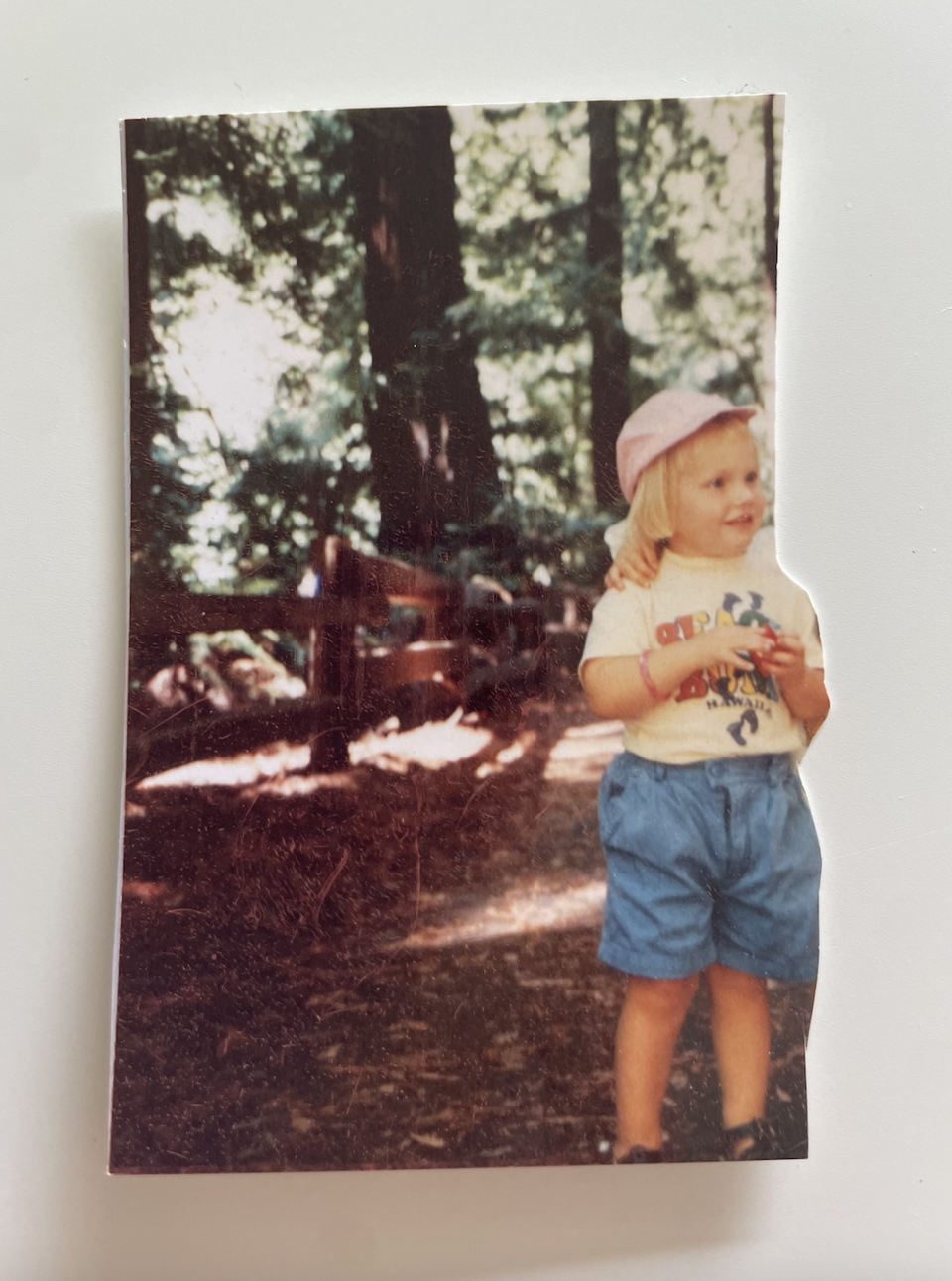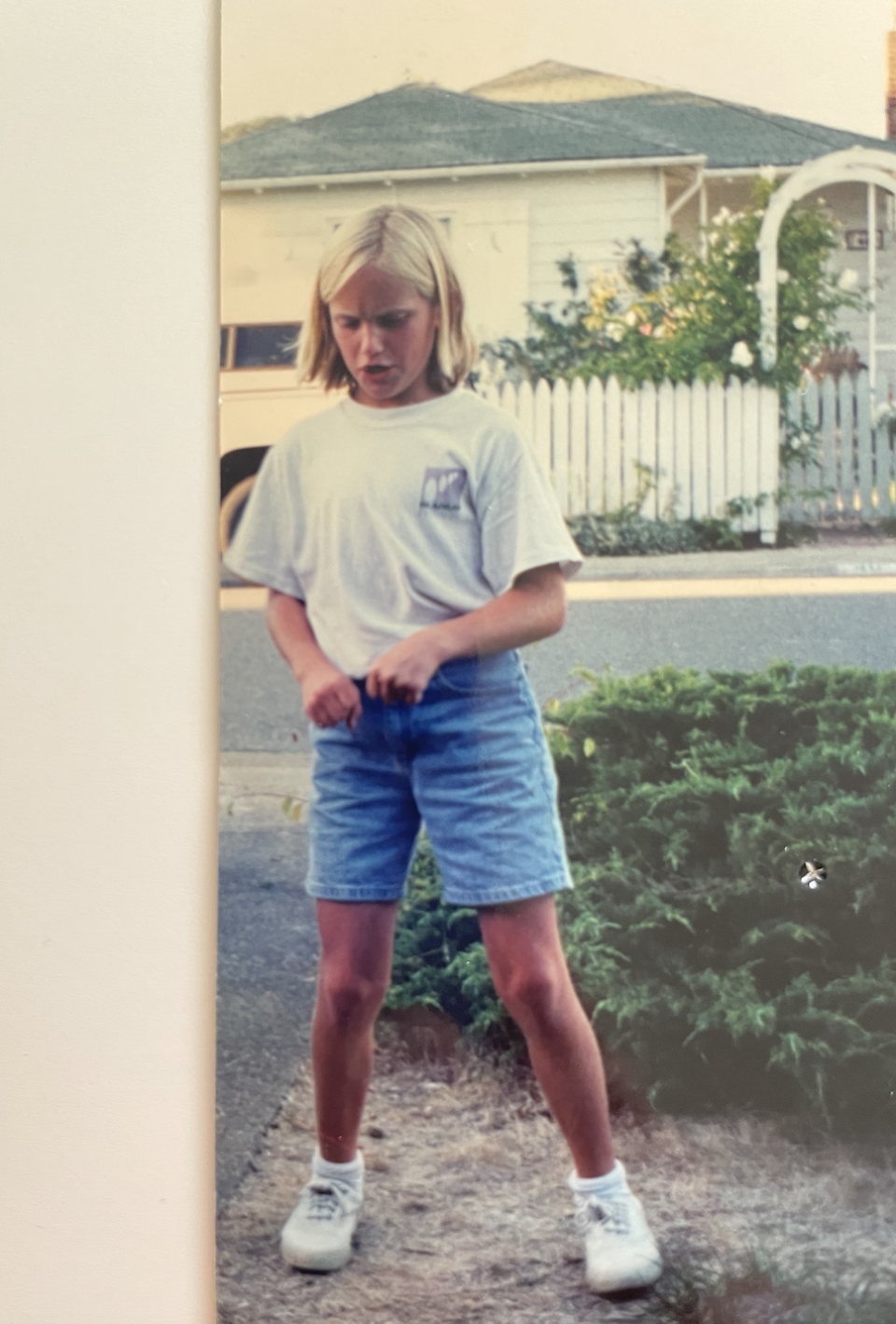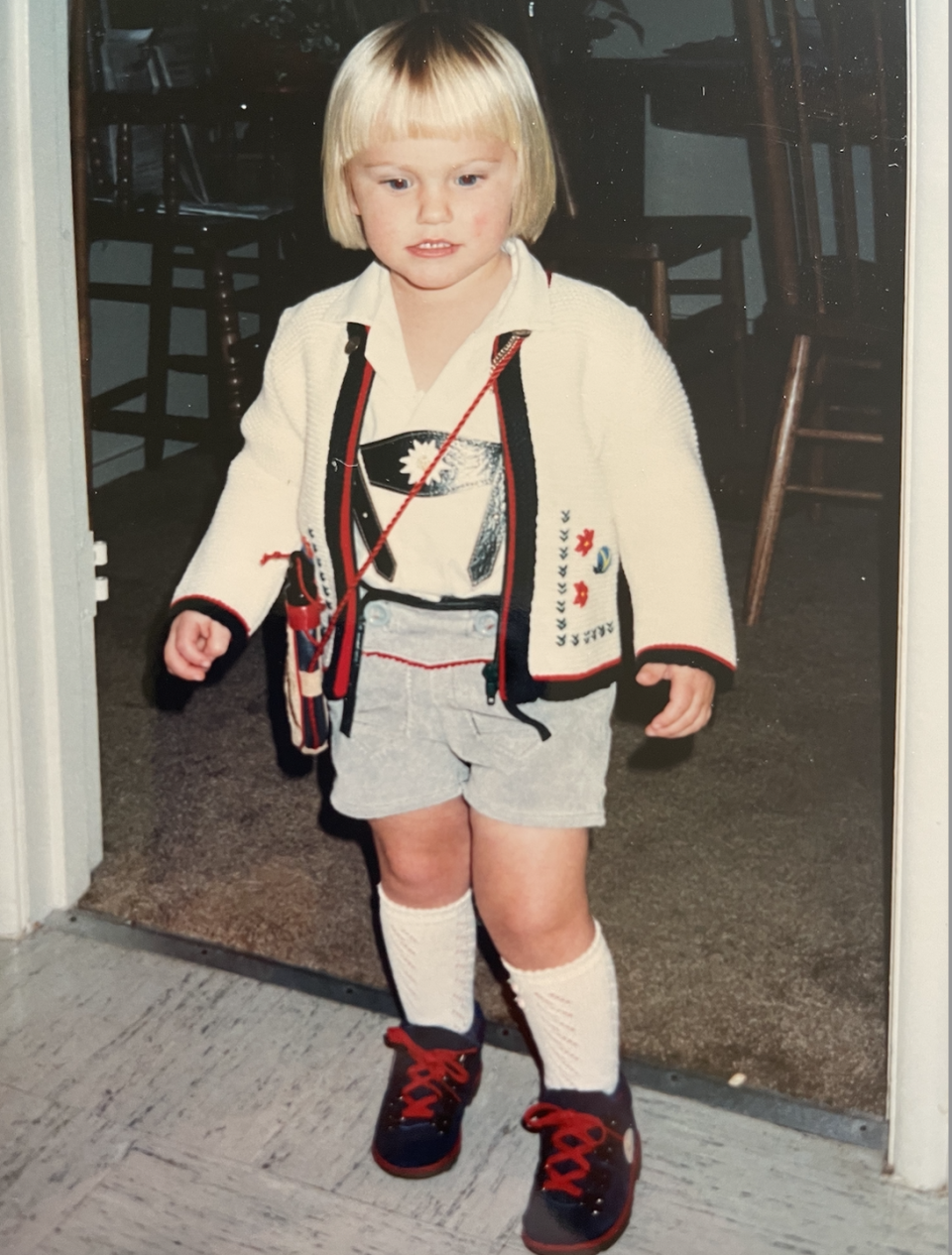Mourning the Trans Boyhood I Never Got

Editor’s note: This piece discusses suicidality and self-harm.
I often think about him. I wonder about what he would have worn at eight, at thirteen, at twenty. I wonder about who he would have been friends with. I wonder who he would have had a crush on. I wonder who he would have dated. I wonder who he would have taken to prom. I wonder who he would have had sex with, at what age. I wonder if he’d have done the same stuff I did — singing in choruses, acting in plays, reading endless books. I wonder if he’d have done so exceptionally well in school. I wonder if like me he’d have been so hard on himself.
I wonder if I’d have been some whole other person. Especially in terms of how others might have seen me. My qualities were frequently ones others made clear were unbecoming of a little girl (talkative, assertive, funny, smart). Would more people have loved me better, if instead I’d gotten to be my actual self? All the time, figure especially back then, I felt the unfairness, the arbitrariness, of all this.
I often contemplate the endless labor of having been closeted all those years, of knowing however deep down what I actually was and having to work to hide it, every endless day. Every time I got dressed, every time I used the bathroom, every time I wrote my own name.

For me the act of hiding began very young, preschool. The whole situation did, I’m sure, take some years for me to wrap my young mind around, but the basics were clear: I knew inside I was a boy, not a girl, even though I also knew this was impossible. I knew to let on otherwise was absolutely forbidden; I never tried.
In preschool and kindergarten everybody used the same bathroom, but in first grade suddenly everything was ruined. I was supposed to use the girls’ room, they told me. To me, though, this made no sense. I watched my friends, mostly boys, as they went into the boys’ room. Once an adult even told me I wasn’t allowed to linger outside the entrance and so now the mere sight of the boys’ room door filled me with shame.
The problem was that I couldn't actually pee in the girls’ room–as in, my body refused. Even if I sat there a long time. Even if I was in there totally alone, which was hard to time right. Something about the whole set-up was entirely wrong, I knew inside, besides. It was wrong, and so was this new name they were having me write at the top of my papers, the name I was told was my real name, not Sandy, the name I had always used and gone by.
Anyway, the bathrooms thing was becoming unbearable.
One day in first grade I wagered I could probably just get through the entire school day without using the bathroom at all.
Middle of the afternoon, all of us silent at our desks, my body finally gave out. The wooden chair beneath me hot and wet, a realization both surreal and horrifying. My panic started to overwhelm but before I could hide what was happening the boy next to me pointed and shouted “She peed!”
Kids stood and gathered to gawk. I was lent some brown dress from the principal’s office, something I’d never choose. I hated the dress, its stupid corduroy, hated the tights as they rolled up my legs. Later that day, I peed again, onto the dress, onto the tights. Yet again. I couldn’t believe myself.
I’d never done anything so bad in my life.
What was wrong with me? Furious adults now demanded to know. I couldn’t say to myself, let alone anyone else.
The first time I remember being physically bullied at school I was in sixth grade. New school, new schoolyard. A pack of boys whooshed by me. One grabbed my arm in both his hands, twisted hard in each direction, what I'd heard other kids call an Indian sunburn; I screamed.
Another of the boys, one I knew from my old school, looked at me, eyes flashing, and with his fingers in a V, lifted his hand to his mouth, wriggling his tongue. Something about this gesture was terrible, I sensed, but I didn’t know what it meant or why.
When eventually somebody must have explained to me it meant lesbian, and maybe even what lesbian meant, I felt outraged. Incensed. This wasn’t right at all. I was not a girl who liked other girls. (This, if anything, felt the opposite of true.)
And yet. Something about what he’d done told me I’d nearly been exposed.
I don’t remember anyone talking to me about what happened, in any compassionate sense. Straight adults weren’t comforting queer kids back then (and back then most all the queer educators were closeted, still, out of necessity). Another time that year, those same boys threw coins at me at a dance. I remember them laughing and I don’t recall anything of consequence happening to them. I don’t remember anybody actually talking to me about what was going on.
I meanwhile got buried beneath an avalanche of shame. By seventh grade I had to abandon the clothes I had felt comfortable in — jeans, t-shirts, Converse sneakers. By eighth, I began trying to befriend girly girls. I bought eyeshadow compacts and studied Cosmo. I began a long quest to impersonate being a young woman to the world, an effort that was unconscious and yet, in hindsight, extremely deliberate.

If I ever got access to a space that was exclusively women — a changing room or sleepover or chorus trip — I felt the strange feeling of being a total imposter. I studied girls as they moved about and did stuff like shave their legs or discuss sex with boys. In such spaces, some girls seemed invariably to smell out my difference and pick on me. So the older I got, the harder I worked to try to pass as feminine, to wear thongs and push-up bras and to hate my body as well as the next woman. It was an act that took up most of my energy and also, on some level, was killing me all the time, whether or not I knew so. I didn’t know much except that I had to survive every day, and then another.
To admit my actual truth, who I was inside, this was still unthinkable. I never even considered it. First and only time I ever saw anybody I knew was like me was in a movie that came out when I was 12, Boys Don’t Cry. I remember feeling such primal elation at the existence of Hilary Swank’s character, the look, the swagger, the button down and jeans. I always knew this was exactly what I was, even though I lacked the benefit of a term for it (trans), even though I lacked any reason to even know other people like me even existed (even though this was twenty years ago, many trans people surely did just fifteen miles away from me in San Francisco).
But I knew my truth. I knew it, privately and alone. I never found a way to convey to anyone what was really going on with me, at least not that I recall. It got harder once I found alcohol. Late at night in college, I did once mutter my truth to a friend, a gay guy. I told him I was a gay guy or something inside, and I didn’t remember doing so until he reminded me, recently.
When I was in my mid-twenties, I became friends with a trans man. Something about his presence was so fundamentally disturbing to me, in the best sense, as if whole stagnant parts of my brain would light on for the first time whenever we shared the same air. But I still didn’t say anything to myself, let alone him, about how alike we actually were. I considered myself quite different from the people I figured were “real” trans people, like him. He happened to be very masc, at least from my point of view; he drove a truck, knew about machines and horses. I told myself I was like, so different. Real trans guys were something else, I told myself, people who’d had surgery or who weren’t terrified of needles (like I was). I figured, naively, “real” trans people were those who could pass as cis. Or at least, in the space of actual information about any of this, I let my bullying head suppose.
Back when I was starting to come out, around age thirty, I knew I would never have surgery or want to inject myself with Testosterone. I was still very terrified of surgery and I was very terrified of needles and of what T might do. I was terrified of who I might lose. My family? My friends? My partner? What if I didn’t like or recognize the person I became, on the other side? There is the pernicious stereotype, familiar at least in queer circles, that trans men are these hormone-fueled monsters, horny and violent. What if I became that?
In my case, there was no life in the closet anymore. As the sun set on my twenties, I felt I had to choose, something else or death. I was eventually going to just give up, I could feel it, whether by virtue of alcohol or a plunge from a balcony or a head-on collision into a median. I was too constrained in that box I’d been put in. I was too tired of feeling like I had no other options.
And I almost did kill myself, more than few times; which was nothing new, for me. I’d been debating this since elementary school. But instead I gave up on courting death. I quit alcohol, a few weeks before my thirtieth birthday. I started coming out, embracing whatever and all that that might bring.
I’ve just celebrated my thirty-sixth birthday, which marks six years without alcohol. I’ve also had top surgery and have now been on Testosterone nearly two and a half years. All that and many other changes later, the truth is my life has never been better. That’s the bottom line. I am, at last, alive.
I am today yet another example of what a relatively minor amount of medical intervention and other shifts can make possible for a person like me. In my case, a person who’s always known inside I wasn’t whatever I was assigned at birth. Not for a second did I ever feel like a “girl” or a “woman.” Would that anyone had bothered to ask me, at any point, about that assumption or how I felt about it.
That’s really that’s all trans liberation is about: the power to assign. Whose decision is it? What you will be? Who you will be? Who you will love? How you will dress? And so on. Will you ever get to live with your own inner truths reflected, or nah?
During the early pandemic, I emailed with an old classmate — we did Girl Scouts together — about our respective top surgeries. We exchanged photos of ourselves now, our chests afterwards. I felt my heart flutter, seeing this person, finally, and showing myself too. Then a couple months ago I got an email out of the blue from a gay guy I dated in middle school (one of, I admit, many gay boys I dated along the way). I’ve wondered a lot about us back then, about how conscious we each were of all this.
My peers and I, we grew up in a boy-girl world, in a she-he world, a pink-blue, a Barbie-Ken, a nothing else sort of world. I had no idea there was any other way to be, and yet how I maintained my own sense of my authentic self, inside, for all those decades. And yet we still found one another, us trans kids, us queer kids. We still knew somehow. Our bodies did perhaps, even if we were all lying. Lying to save our lives.
I think about me in preschool in 1990, deciding to never let on that I would have preferred to pee standing up or to wear ties or whatever else would have, to me, signified “boy.” I had never heard terms like “nonbinary” or “transgender;” I wouldn’t learn such a word during my childhood. I maybe saw RuPaul on TV sometimes, whether or not I understood what drag was. Kids today, they’ve heard the terms “transgender” and “nonbinary”. They can probably name not just RuPaul but many drag queens. You cannot make them un-know the truth now. The truth that they belong in the world, and that this world is for them, too.

What you can do, however, is deaden their spirits sufficiently so that they do not feel it possible or wise to ever be real about who they are. Or to let them decide that their better option is their own death. Whether the slow kind where you stay quiet and closeted and pretend and drink or take pills or whatever, or the swifter kind. A plunge, an accident. I want to be clear that had I killed myself as a teenager, as I thought about so often, everybody would have mourned a promising young woman who had never showed a sign of anything being wrong. That is, unless, you were paying really close attention, which (I thought) fortunately for me back then, few were.
Sometimes I do get really sad, thinking about the trans boyhood I never got. I sob, like full-on belly sob, feeling this immense pain pass through me. Sometimes I get really angry. I get spiteful at individual people who probably did see the truth or should have and didn’t help me. I get self-pitying, thinking about all those things I’ll never get to experience. How I’ll never be nine or fourteen or twenty-one again. How I’ll never get any do-overs.
Or I contemplate how my life might have been even harder out of the closet, had I been aware and brave enough to actually come out. I contemplate the potential in fact that I would have found life outside the closet (especially back then, relatively isolated if not totally alone) even more hazardous than the path I’ve lived instead. I’ve contemplated who would have taken me in, if I’d gotten kicked out of my house, which I imagine I would have. I wonder what challenges I may have encountered, if I’d moved across the bridge to the Castro, say, as a trans teen in the early aughts.
I know these mental exercises cannot productively change the past. Fantasies are merely that. My actual story is I survived many years wearing a sort of woman-drag and feeling absolutely near-death inside, often seeking to be very drunk to feel slightly better, and avoiding looking inside myself lest I run into any truths. I autopiloted as best I could despite all this. I happened to emerge alive.
Others do not survive. They might choose to bring a lifetime supply of whiskey or vodka into the closet with them and die there. Maybe just a mean companion. Maybe just their own self-loathing, deep enough to drown in.
Other times, I notice that, actually, I did live a trans boyhood already — albeit a closeted one. I’ll recall certain choices I made that were such giveaways. I will sometimes know I’ve always been who I am and who I am now: a queer guy who loves singing and baking and flowers and shit.
The other day I had a strong sudden memory come back, a buried one, me soloing the boy part in “Can You Feel the Love Tonight” during a singing recital in first grade. I recalled how I’d been so utterly gratified to get to sing Simba’s verse, not Nala’s. Even if nobody else paid attention to these moments; it was major for me, every time I stepped forward to sing my part.
I sat down at the piano and sang the lines (composed by Elton John no less), with my voice now. I burst into tears.
Or as another example, some of my oldest most enduring friendships are with men — some gay, a few straight. They’re the ones I text with about everything and nothing, or talk to on the phone for a few hours on occasion. Such people, they’ve been friends with me all this while. They’ve always treated me as I am, even when my outsides didn’t look like this. They knew who I was, even if I was always trying to hide. They have always treated me as one of the guys.
But oh the glorious feeling that is my actual trans life, now. These last few years, going through puberty again, now in my mid-thirties, I am all the time surprised and delighted by my body. By the solid feel of my chest, fortifying with muscle. By the protrusion of my Adam’s apple. By the arrival of hair on my hands, on my thighs. What gratitude I feel for such things. What gratitude I feel for the face that looks back at me in the mirror. I’m even sort of grateful for the less pleasant parts, the brutal jawline acne and the sweating and the sudden need to shower twice daily if I don’t want to stink.
Just this last week, having shaved off my beard for the very first time, I have been learning the hard lesson that facial hair growing back in is annoyingly itchy. As I experience these bodily trials, ones new to me (ones that are no doubt familiar to many), I do envy an alternative fictional version of myself who got to go through all this along with my cis peers.
So it does make me sad, mourning the trans boyhood I never got. Then I’ll listen to the news and be reminded of how, right now, every day, some people are fighting adamantly to ensure trans children are still given a world that is neither loving to them, nor safe. I am sometimes overwhelmed by all the sorrow there is to feel. I’ve become the sort of guy who rarely engages with the news, if possible. I’ve become the sort of guy who meditates every morning.
I’ve become the sort of person who thinks about my inner child, specifically I think about that trans kid inside. Sometimes I try to listen to the really young guy inside. For many reasons I wonder how much that person was recognized, let alone honored. I try to listen to him now, which feels nice.
Some hard mornings, I try to think very explicitly in terms of: What does my inner child want to eat for breakfast? (Plain cheerios in a bowl.) What does my inner child want to watch? (Bugs Bunny.)
I comfort and soothe him.
I try to listen if he’s upset about stuff, including stuff that happened a long time ago. Because I know to him it was all real. I know that even if I don’t always consciously remember everything we survived, he does.
I know how much nobody ever listened to him.
I know how much nobody ever told him: I see you exactly as you are.
And: You matter, kid.
And: I hope you stick around.
I’m so grateful to him, that he did.
You Might Also Like

